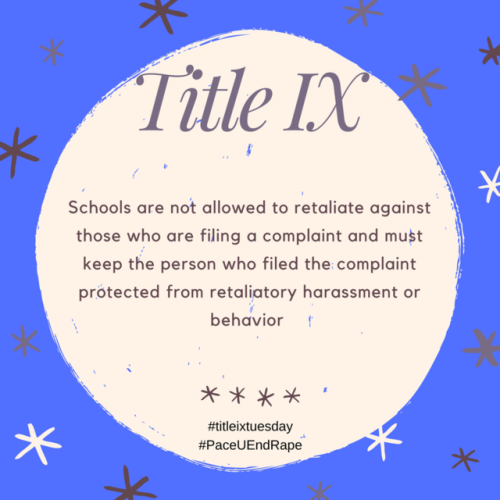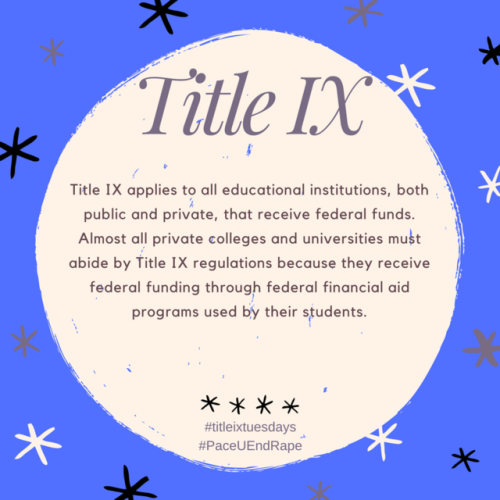#title ix
Trans and LGBT groups are celebrating new U.S. Department of Education guidelines, which state for the first time that Title IX, the federal law prohibiting sex discrimination at schools and colleges that receive federal funds, applies to transgender people.
From the DOE’s Office of Civil Rights:
A school should investigate and resolve allegations of sexual violence regarding LGBT students using the same procedures and standards that it uses in all complaints involving sexual violence. The fact that incidents of sexual violence may be accompanied by anti-gay comments or be partly based on a student’s actual or perceived sexual orientation does not relieve a school of its obligation under Title IX to investigate and remedy those instances of sexual violence.
The Bilerico Project has the story here. Here’s reaction from the Transgender Law Center, the Human Rights Campaign, and the National Center for Transgender Equality.
Post link
The 98 US Candidates who want to eliminate Title IX sex-based protections for women
US Sisters:
The fight is far from over.
As you know we are trapped between the right and the left, and neither fully represents the needs of women.
As Dworkin said, the right sees women as private property; the left sees women as public property.
Here is a list of Democrat politicians who have promised to remove Title IX, eroding sex-based protections for women.
Please contact your representative encouraging them to uphold the legal definition of woman. We are oppressed in order for men to access our bodies; we are oppressed on the basis of sex.
“In a remarkable letter released just days before the 2018 mid-term elections, 98 candidates declared their intention to eliminate Title IX sex-based equality protections for women, replacing the protected category of "sex’ with ‘gender identity’ - a nebulously defined legal category based on an individual’s subjective identification with a social sex role defined by adherence to sex-stereotypes.
The signatories all state that legal rights for women which mandate equality based on sex are 'cruel’ to males, and 'unscientific’.”
by Emanuella Grinberg |CNN

For a long time, Joanna Espinosa struggled to make sense of it all.
Yes, he was her boyfriend. No, he hadn’t pinned her down, or threatened violence. But Espinosa insists that he coerced her, psychologically and physically, into having sex against her will for most of their three-year relationship. She resisted, told him no, pushed him away. More often than not, he persisted and she gave in “just to get it over with,” she says.
“I knew that it was sexual assault, but at the time, I felt extreme shame and was not ready nor willing to fully accept what was happening,” said Espinosa, 24. “Like most unpleasant truths, I buried it until the end of my relationship, when I realized I was holding onto a relationship with a man who was abusive.”
The relationship came to an end in February 2013. The next month, Espinosa filed a sexual harassment claim against her former boyfriend with her school, the University of Texas-Pan American, where some of the incidents occurred.
She says she went to the school first because she thought that without concrete evidence law enforcement would not take her seriously – a common experience among people who report rape to law enforcement, experts say. Besides, she knew that colleges and universities are federally mandated to investigate sexual violence under Title IX, a federal civil rights law that guarantees students the right to an education free of sexual violence, which is considered a form of discrimination.
Indeed, when she went to the city of Edinburg Police Department a few days later, she says they told her that her case would be difficult to prove and took her phone number. She never heard back from them, she says.
Her experience with UTPA administrators was no better, she says. At various stages of the investigation, they questioned why she did not come forward sooner with the abuse claims, suggesting she was acting out as a spiteful ex-girlfriend. In one meeting, she says, administrators asked whether their relationship was “Facebook official” or whether there was a “promise of marriage.”
It took five months for school administrators to reach the conclusion that Espinosa’s complaint was “unsubstantiated.” They did, however, conclude her ex-boyfriend abused his access to university facilities, and placed him on disciplinary probation for the remainder of his academic career, according to documents provided by Espinosa.
Espinosa’s voice quivers as she recalls the ordeal, which led her in 2013 to drop one class in the first summer session and request an incomplete in the second.
It was a punch in the gut after sleepless nights and constant self-doubt, she said. She believes the school violated her civil rights by mishandling the complaint and creating a sexually hostile environment.
This week, Espinosa filed a complaint with the Department of Education’s Office of Civil Rights alleging violations of Title IX.
A UTPA spokeswoman said the school had not seen Espinosa’s complaint, but noted the school does not comment on pending investigations.
Espinosa’s complaint makes UTPA the latest school to face criticism for its handling of a sexual assault report. So far in fiscal year 2014, the Department of Education’s Office of Civil Rights says it has received 16 complaints that included Title IX allegations specifically related to sexual violence.
Those numbers come on the heels of a marked year-to-year increase in complaints the department received, from 17 in 2012 to 30 in 2013.
The U.S. Department of Education laid out minimal requirements in a 2011 “Dear Colleague” letter for schools to follow in responding to reports of sexual harassment, or risk loss of federal funding.
The 19-page letter reminded schools that under Title IX, which prohibits discrimination on the basis of sex, colleges and universities must apply a “preponderance of evidence” standard to reviewing rape cases, which means they must operate under the assumption that “more likely than not that sexual violence occurred.”
Now, many are under scrutiny from the federal government. The U.S. Department of Education’s Office of Civil Rights has 35 pending Title IX investigations involving allegations of sexual violence at schools such as the University of North Carolina, Princeton, Harvard, Swarthmore, the University of Southern California, Dartmouth and Occidental, a Department of Education spokesman told CNN.
Rape is a longstanding issue on college campuses, but the latest movement, led by student activists, survivors and faculty, recasts sexual violence as a cultural problem on campuses nationwide – not just a series of isolated incidents.
Students are taking matters into their own hands, filing complaints en masse and speaking out publicly.
They’ve flocked to advocacy groups such as End Rape on Campus and Know Your IX, which sprang from grassroots activism around university handling – or mishandling – of sexual violence.
President Barack Obama recently called the nationwide, student-led movement a catalyst for a federal task force to protect college students from sexual violence on campus.
The bravery of students who’ve spoken out – and their ability to connect to each other through social media – has sparked a paradigm shift on campuses, said Gina Smith, an attorney who has consulted with schools around the country on sexual assault policy.
“What we’re seeing is a demand that schools treat complainants with compassion,” Smith said. “Schools are stepping up and taking notice.”
From one campus to the next, the concerns are mostly the same, said sexual assault policy consultant Leslie Gomez: lack of clarity, students being mistreated, complex procedures and insufficient training among those leading the processes.
At the UTPA, Espinosa appealed the decision in her case, but the administration upheld it. She reached out to advocacy group End Rape on Campus, and a member of the group helped her file a complaint with the federal Office of Civil Rights.
“I’m not sure I would’ve come forward if all these people hadn’t done it before me,” Espinosa said. “I needed the validation. I needed someone to confirm, ‘You’re right you’re not blowing things out of proportion.
"It was a relief to hear someone tell me, 'You have a case, and they shouldn’t treat you this way.’”
Here are just some of the students and activists trying to change the way their schools handle sexual violence – for good. CNN does not name survivors of sexual assault, but is doing so in this case because these people, including Espinosa, chose to come forward in the hopes of holding their schools accountable and encouraging others to speak up.
Sarah O'Brien, Vanderbilt University

Despite an ongoing, high-profile rape case involving four football players, Nashville’s Vanderbilt University community hasn’t exactly rallied to change campus culture, alumna Sarah O'Brien, 22, said. But that hasn’t stopped O'Brien and others from working with administrators to clarify the school’s policies around sexual violence, and raise awareness of how the school can help.
“Our campus is not liberal and it’s not activist, so when a group of students come together around an issue it stands out,” says O'Brien, who graduated from Vanderbilt in December.
In 2010, an acquaintance raped her while she was drunk, she said. A series of frustrating encounters with school administrators led O'Brien to come out publicly as a rape survivor in fall 2012.
One administrator attributed her PTSD to the stress of being a student athlete; another told her a statute of limitations prevented her from reporting the rape.
She later found that Title IX gave her the option of seeking academic leniencies due to her PTSD diagnosis, but such provisions were not laid out Vanderbilt’s policy, she said.
“I just felt that university failed me in a lot of ways,” O'Brien said. “As I started talking to other women [at Vanderbilt], it became a common complaint.”
After going public, she organized a Take Back the Night event and began working with student athletes and survivors. She reached out to Know Your IX’s founders, culminating in a complaint with the U.S. Department of Education accusing Vanderbilt of violating of Title IX and the Clery Act, a federal law that requires public disclosure of crimes on campus.
The same month, campus group Vanderbilt Students of Nonviolence delivered an 11-page list of demands. Students asked the school for a single office focused on sexual assault prevention and treatment; a website that pulls together all campus resources and protections afforded under Title IX; posters around campus discouraging sexual violence; inclusion of students on boards related to campus life and sexual assault policies; and more training in sexual assault prevention for people on those committees.
It’s what O'Brien looked for and couldn’t find after her alleged assault, she said.
“The last thing you want to is dig through a bunch of websites and contact administrators who don’t know even know the policy when you’re dealing with a sexual assault,” she said.
Already, changes are under way. The campus hosted an open forum on sexual violence led by a lawyer.
In an e-mailed statement, Beth Fortune, Vanderbilt’s vice chancellor for public affairs, said posters are up that say, “Sex without consent is sexual assault." The Project Safe website is live and the office is underway, among other efforts.
"We want to make it as easy as possible for victims of sexual misconduct to get the services they need,” Fortune said.
Since graduating, O'Brien is still involved with Vanderbilt Students of Nonviolence. She’s also working to build a shelter for survivors of sexual violence in Nashville.
“I think change will be a slow process,” she said, “but we’re starting to see it.”
John Kelly, Tufts University

Rape is something anyone can experience, regardless of gender or sexual orientation. It’s something John Kelly knows firsthand, and wants others to remember.
In just 18 months, the 20-year-old Tufts University student has gone from admitting to himself he had experienced partner rape to becoming a leading LGBTQ voice on education policy about sexual assault.
Like many survivors who go public, he did so out of frustration with his school’s adjudication process. Kelly believes the Massachusetts university let his attacker off easy – he was suspended, rather than expelled – because the school didn’t consider oral sex to be rape.
“It was really traumatic, trying and poorly executed,” Kelly said of Tufts’ adjudication process.
But other parts of the process revealed where Tufts “did a fantastic job.” The Title IX office performed a thorough investigation and advocated on his behalf when he was hospitalized after a suicide attempt, Kelly said. It facilitated a no-contact order for his attacker, arranged therapy and made sure he could return to classes.
“I saw the potential for Tufts to have a really strong policy,” he said. “We were halfway there; the problem was in the punishment phase.”
Kelly ran for student senate and got involved with the campus group Action for Sexual Assault Prevention. It teamed up with another group, Consent Culture Network, on an April 2013 letter to Tufts officials, calling for eight major policy changes.
A Tufts University spokeswoman said the school began to “take a deep look at all of its policies and procedures regarding sexual misconduct,” after the 2011 U.S. Department of Education letter, and continued those efforts in 2013, when the university president convened the Task Force on Sexual Misconduct Prevention.
School officials would not comment on Kelly’s case, and he has not filed a Title IX complaint against the school. He says he is trying to make headway by working on a task force subcommittee addressing prevention through policy and campus culture.
He’s also working with the national organization Ed Act Now, which drew more than 175,000 signatures on a petition urging Education Secretary Arne Duncan to hold schools accountable for failing to comply with Title IX and Clery laws.
Kelly and others met with Duncan and others from the Obama administration and Department of Justice. He now serves on the Department of Education’s Negotiated Rulemaking Committee on the Violence Against Women Act, helping to shape the regulations surrounding recent changes to the law.
“We want to make things more survivor-centered, make sure support systems are in place to increase students’ mental, emotional and physical safety,” he said.
Sofie Karasek, University of California, Berkeley

The University of California, Berkeley was Sofie Karasek’s dream school, a progressive campus, perfect for an activist like herself. She never imagined she’d be advocating for herself.
Karasek said her path took a detour one night in her first year, when she was sexually assaulted at an off-campus event. Ashamed, she told just a few others, and buried the incident – until she learned the same person had assaulted three other students. In April 2012, they met with administrators to tell their story. The following month, Karasek and two others filed a report against him with the school, and waited to hear back.
Six months later, Karasek said she heard through a mutual friend about the resolution: He would be graduating early. No investigation had been conducted as far as she knew; at least none involving her or the other women.
“I gave them the benefit of doubt,” she said. It turned out they weren’t talking to anyone except him, she said, “to resolve it on his terms.”
The school responded to Karasek’s request for an update two days before his December 2012 graduation, saying that he had been found in violation of the student code of conduct and that the case was solved through an early resolution process, she said. The school only confirmed in September 2013 that he had graduated in December, she said.
UC Berkeley did not respond to requests for comment.
Karasek was emboldened to speak out about her experience. With the help of students from other universities, she and eight other students filed a Clery complaint against UC Berkeley in May. But instead of filing the complaint silently, she and another student issued a press release while attorney Gloria Allred held a press conference to announce that complaints had been filed against Berkeley, Dartmouth, Swarthmore and the University of Southern California.
The experience has launched Karasek into the activist spotlight. She testified at a joint legislative committee hearing in August 2013, leading the state legislature to order an audit of sexual assault policies at UC Berkeley and three other state schools. The results are expected in April.
In December, an aide from California Assemblyman Mike Gatto’s office reached out, asking whether she would testify on behalf of a bill requiring universities to report all sexual assaults and violent crimes to local law enforcement. Karasek suggested modifying the bill to require that that all violent crimes be reported except in cases where survivors request otherwise. He listened and introduced the amended bill to the state education code with her suggested caveat.
But progress at UC Berkeley has been “lackluster,” Karasek said. In September, the school introduced an interim policy that allows survivors to appeal their cases, among other changes. But Karasek wishes more meaningful improvements would come, including more staff dedicated to the issue, as well as Title IX coordinators, and for the “preponderance of evidence” standard written into UC Berkeley’s policy.
Really, what Karasek wants is the school to implement a process for formal hearings and investigations in sexual assault reports – something that was missing from her experience with the reporting process, she said.
But a Title IX advisory committee convened by the school chancellor to review policies that she sits on has only met once, she said. Otherwise, nothing much changed, she said.
“The people who are dedicated to changing policy are students,” she said. “We’re recognizing the snowball effect that comes from speaking out.”
Caroline Heldman, Occidental College

Caroline Heldman remembers how it feels to go to bed hungry or cold. She grew up poor in rural Washington state, and remembers the “pain of people looking down on you,” of being the first person accused when something went missing, and being shunned and teased. Still, her father’s Pentecostal leanings ingrained in her a duty to serve others and the view that “someone else’s suffering is my own suffering,” she said.
Heldman, an Occidental College professor, has become one of the leading faculty figures helping students file federal complaints involving the handling of sexual assault cases.
“There’s not a single school that isn’t thinking about this,” Heldman said.
Heldman and colleague Danielle Dirks helped 37 students and alumna file a Title IX complaint in 2013. She served as a faculty advisor to End Rape on Campus, which connects survivors with resources for treatment and options for holding schools accountable.
This past week, in a Google Hangout, she walked Espinosa, the University of Texas-Pan American student, through the process to file her complaint.
“My work is very much driven by the fact that we don’t live in a meritorious society and some people are more likely to experience pain and suffering than others,” she said. “A lot of us are very comfortable acknowledging that given certain circumstances, we could be in the same bad situation as someone else. But it’s more than that – it’s about seeing yourself in others.”
As a young idealist, Heldman thought she could fix everything that was wrong in the world – from the headlight ordinances she argued for as a child in Washington to the social justice causes she took up as an undergrad.
As a full-time professor with tenure at Occidental, Heldman feels a responsibility to speak up about how schools treat victims of sexual violence. Many educators have less freedom to speak out about controversial topics, she said, which puts her in a unique position to help.
“Power in colleges has shifted dramatically in recent years to the administrative side,” she said.
“Those of us who are tenured need to use our academic freedom because we’re the only ones at institutions who have power to speak out when administrations mistreat students.”
Anusha Ravi, Emory University

As far as Anusha Ravi is concerned, how a school deals with sexual assault is a reflection of the entire campus community – and it’s everyone’s job.
As more schools made national headlines with students’ allegations of mishandling of sexual assault reports, Ravi began to wonder, how are handling these kinds of things at handled at her school, Emory University in Atlanta?
That’s why the 20-year-old political science student joined the student group Sexual Assault Peer Advocates. The group provides training to undergraduate and graduate students about how to talk to sexual assault survivors.
It’s a skill most college students will need at some point, Ravi said. She has not personally experienced sexual assault, but she knows people who have. Understanding how to talk about sexual assault fosters a climate of openness within the school community, she said.
Because sexual assault affects women more often than men, she said, a school’s mishandling of sexual assaults projects a sexist image, and for better or worse, so much has to do with image.
“It doesn’t look good for higher education in general and doesn’t make an institution look good,” she said. “As a college student, I do believe that when people are evaluating their own education, they’re not only looking at classes, but campus culture and safety.”
So far, Ravi is satisfied with Emory’s approach.
After the 2011 Department of Education letter, Emory created a university-wide sexual misconduct policy and adjudication process in 2013, a university spokeswoman said in an e-mail.
The school now has Title IX coordinators for each college and supports groups such as Sexual Assault Peer Advocates in its efforts to improve campus culture.
The group has trained more than 1,000 people, from fraternity groups to residence advisers, Ravi said.
“Nobody wants to be the school that treats people poorly, especially sexual assault survivors,” she said. “We all have a role to play.”
Thank you Joe Biden for being an advocate for survivors and #TitleIX. Since Title IX guidelines were introduced in 2011, we’ve seen more schools hire Title IX coordinators and begin to more effectively address sexual assault incidents on campuses. We cannot walk back this progress – we need to stand strong with survivors of sexual assault and make sure school administrations are held accountable for providing the support and protections ensured by Title IX. Take a stand and join the #ItsOnUs movement → http://www.itsonus.org/pledge
The logic used to excuse sexual assault is completely illogical. Exhibit A ↑↑↑ The first step to ending the culture of sexual assault is calling out the language that perpetuates it. #ItsOnUs to be a part of the solution → www.itsonus.org/pledge
Sweatpants & Equality | National Girls & Women in Sports Day

Who has two thumbs and loves sports? This girl right here. There are very few sports that I don’t enjoy watching or haven’t dreamed of playing. I’ve played1 softball and basketball competitively. I was recruited for—though I didn’t end up joining—the cross-country team in high school. I definitely got down with some Ultimate Frisbee in college. I rock two little scars on my chin; one of them I…
DO OUR CONSTITUTIONAL RIGHTS NOT EXIST ANYMORE AT UNIVERSITIES??
The judge refused to give me a restraining order on the Dean of Students at New Mexico Highlands University. I cited case laws and told the court how he deprived me of my constitutional rights such as freedom of speech, peaceful assembly on public property, right to remain silent, right to make my own health choices and right to an attorney. I had no lawyer present or witnesses while he had his lawyer who claims that University laws supersede constitutional laws. The judge did not recognize my constitutional rights being violated and did not give me a restraining order because I was not in serious danger or threat of harm. I explained that my emotional health is being affected by the harassment from the dean and how he put university restrictions on my without proper due process. After telling the Board of Regents, The Vice President, The President and the Dean himself several times that I would not like to speak to the Dean and even police officers told me that I don’t have to speak to him and can speak to someone else, the Dean still sends me emails saying I have to meet with him and comply with sanctions. I refuse to be dragged into another meeting as to be bullied and harassed by this man alone and therefore should have a restraining order because my grades are being affected as well as other emotional trauma. He failed to cross examine the men who have raped and abused me as I brought in text messages and pictures of my injuries from an assault. His lawyer made it clear that he is the Dean and is responsible for disciplinary actions. I said that is false because due process requires an impartial judge and a jury which should have been other University members during the hearing. I cited case laws to prove the University is not higher than constitutional law. Please let me know if I’m wrong. The dean is trying to get rid of me after he found out that I was exposing things going on around campus and bringing forth an audio recording of a witness testifying to a prostitution ring on campus, which he made me delete during a meeting with my father present. He sent letters threatening suspension/expulsion if I did not go to his meeting because I refuse to go to a mental health therapist of the University’s choice. He is doing that in an attempt to silence me while he is covering up the corruption on campus. I am restricted from the library, computer labs and anywhere on campus without permission except for my classes at specific times. I don’t think this is even legal. I just contacted the ACLU and Foundation for Individual Rights in Education and believe it is time to get a lawyer after not being able to represent myself in court. The judge said that this legal stuff I brought forward is not accurate and that this is a University matter only to be handled by the University. Please tell me this applies to Universities and they are my individual rights: Tinker v. Des Moines I retain all of my constitutional rights while I am a student, and thus I have a right to a proper hearing with more than just the biased Dean of Students, a Dean who has a personal issue with me and will not let anyone else handle the situation, even though his superiors, such as the University President, could have easily handled the matter.
Marbury v. Madison, 5 U.S. 1 Cranch 137 137 (1803)
It is also not entirely unworthy of observation that, in declaring what shall be the supreme law of the land, the Constitution itself is first mentioned, and not the laws of the United States generally, but those only which shall be made in pursuance of the Constitution, have that rank.
Thus, the particular phraseology of the Constitution of the United States confirms and strengthens the principle, supposed to be essential to all written Constitutions, that a law repugnant to the Constitution is void, and that courts, as well as other departments, are bound by that instrument.
U.S. v. Lee,106 U.S. 196, 220 1 S. Ct. 240, 261, 27 L. Ed 171 (1882)
“No man in this country is so high that he is above the law. No officer of the law may set that law at defiance, with impunity. All the officers of the government, from the highest to the lowest, are creatures of the law are bound to obey it.”
“It is the only supreme power in our system of government, and every man who, by accepting office participates in its functions, is only the more strongly bound to submit to that supremacy, and to observe the limitations which it imposes on the exercise of the authority which it gives.”
Downs v. Bidwell, 182 U.S. 244 (1901)
"It will be an evil day for American Liberty if the theory of a government outside supreme law finds lodgement in our constitutional jurisprudence. No higher duty rests upon this Court than to exert its full authority to prevent all violations of the principles of the Constitution.”
Miranda v. Arizona, 384 U.S. 426, 491; 86 S. Ct. 1603
“Where rights secured by the Constitution are involved, there can be no ‘rule making’ or legislation which would abrogate them.”
Norton v. Shelby County, 118 U.S. 425 p. 442
“An unconstitutional act is not law; it confers no rights; it imposes no duties; affords no protection; it creates no office; it is in legal contemplation, as inoperative as though it had never been passed.”
Sherar v. Cullen, 481 F. 2d 946 (1973)
“There can be no sanction or penalty imposed upon one because of his exercise of constitutional rights.”
Simmons v. United States, 390 U.S. 377 (1968)
“The claim and exercise of a Constitution right cannot be converted into a crime"… "a denial of them would be a denial of due process of law”.
Roe v. Wade, 410 U.S. 113 (1973)
The Ninth Amendment obviously does not create federally enforceable rights. It merely says, “The enumeration in the Constitution, of certain rights, shall not be construed to deny or disparage others retained by the people.” But a catalogue of these rights includes customary, traditional, and time-honored rights, amenities, privileges, and immunities that come within the sweep of “the Blessings of Liberty” mentioned in the preamble to the Constitution. Many of them, in my view, come [410 U.S. 211] within the meaning of the term “liberty” as used in the Fourteenth Amendment.
First is the autonomous control over the development and expression of one’s intellect, interests, tastes, and personality.
These are rights protected by the First Amendment and, in my view, they are absolute, permitting of no exceptions. See Terminiello v. Chicago, 337 U.S. l; Roth v. United States, 354 U.S. 476, 508 (dissent); Kingsley Pictures Corp. v. Regents, 360 U.S. 684, 697 (concurring); New York Times Co. v. Sullivan, 376 U.S. 254, 293 (Black, J., concurring, in which I joined). The Free Exercise Clause of the First Amendment is one facet of this constitutional right. The right to remain silent as respects one’s own beliefs, Watkins v. United States, 354 U.S. 178, 196-199, is protected by the First and the Fifth.
Third is the freedom to care for one’s health and person, freedom from bodily restraint or compulsion, freedom to walk, stroll, or loaf.
These rights, though fundamental, are likewise subject to regulation on a showing of “compelling state interest.” We stated in Papachristou v. City of Jacksonville, 405 U.S. 156, 164, that walking, strolling, and wandering “are historically part of the amenities of life as we have known them.” As stated in Jacobson v. Massachusetts, 197 U.S. 11, 29:
“There is, of course, a sphere within which the individual may assert the supremacy of his own will [410 U.S. 214] and rightfully dispute the authority of any human government, especially of any free government existing under a written constitution, to interfere with the exercise of that will.”
New Mexico Statute Code §30-3A-2:
As provided in §30-3A-2, harassment consists of:
A person (defendant) knowingly pursuing a pattern of conduct;
The pattern of conduct is intended to annoy, seriously alarm or terrorize another person;
The pattern of conduct serves no lawful purpose; and
The conduct must be such that it would cause a reasonable person to suffer substantial emotional distress.
tag #nmhu
Post link
Betsy DeVos announces roll back of Obama-era Title IX sexual assault guidelines
Secretary of Education Betsy DeVos on Thursday announced that the Trump administration is rolling back sexual assault guidelines issued by former President Barack Obama’s administration.“The system established by the prior administration has failed too many students,” DeVos said during a speech at George Mason University in Arlington, Virginia. “That’s why we must do better, because the current approach isn’t working.”In 2011, the Obama administration told colleges and universities that they have an obligation under Title IX to combat sexual harassment and sexual assault on campus. If colleges and universities do not meet that obligation, the Obama administration threatened to pull their federal funding. Read more.Post link
We couldn’t possibly be more in love with Chelsea Baker. This High School Junior is the star pitcher for her school’s Baseball - not softball - team.
She’s a serious trailblazer. We’ve got a feeling we may be seeing her take her knuckle ball to a College Baseball team in a couple of years.
We’re rooting for you, Chelsea!
To read the full article in teenvogueclick here.
http://www.teenvogue.com/my-life/profiles/2014-05/chelsea-baker-baseball
Post link









